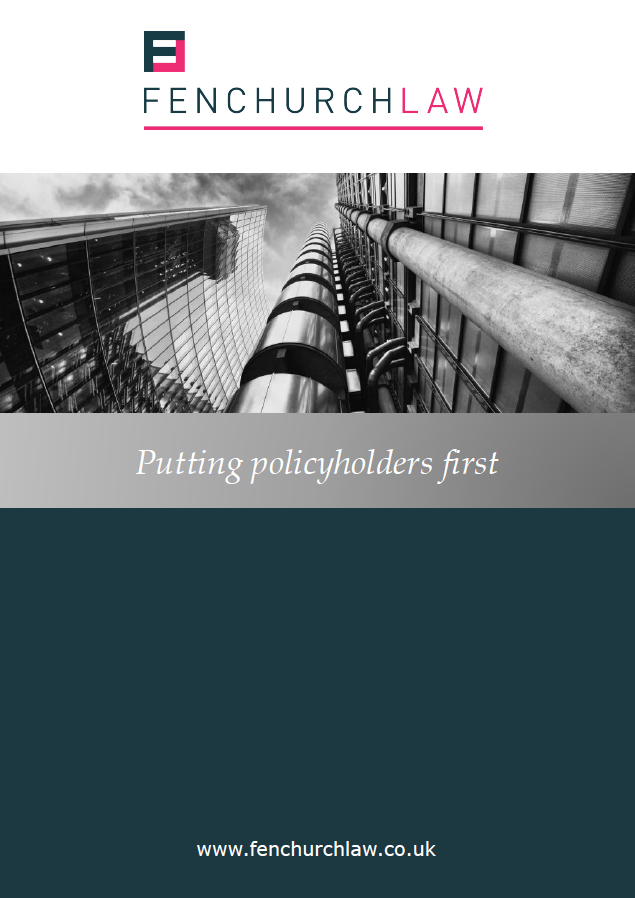
The Good, the Bad & the Ugly: #23 (the Good): Scotbeef Limited v D&S Storage Limited (In Liquidation) Lonham Group Limited [2024]
Welcome to the latest in the series of blogs from Fenchurch Law: 100 cases every policyholder needs to know. An opinionated and practical guide to the most important insurance decisions relating to the London / English insurance markets, all looked at from a pro-policyholder perspective.
Some cases are correctly decided and positive for policyholders. We celebrate those cases as The Good.
In our view, some cases are bad for policyholders, wrongly decided and in need of being overturned. We highlight those decisions as The Bad.
Other cases are bad for policyholders but seem (even to our policyholder-tinted eyes) to be correctly decided. Those cases can trip up even the most honest policyholder with the most genuine claim. We put the hazard lights on those cases as The Ugly.
#23 (the Good): Scotbeef Limited v D&S Storage Limited (In Liquidation) Lonham Group Limited [2024]
The Technology and Construction Court (“the TCC”) has recently provided welcome guidance on the interpretation of the Insurance Act 2015 (“the IA 2015”), when considering preliminary issues in Scotbeef Limited v D&S Storage Limited (In Liquidation) Lonham Group Limited.
The Liability Dispute
Scotbeef Limited (“Scotbeef”) issued a claim against D&S Storage Limited (“D&S”) in July 2020 in relation to the supply of defective meat. D&S stated that, applying the terms of the Food Storage & Distribution Federation (“the FSDF”), of which they were a member, their liability for the defective meat was limited to £250 per tonne.
The TCC found that the FSDF terms had not been incorporated into the commercial contract between D&S and Scotbeef, and as such were unenforceable.
The Coverage Dispute
After D&S became insolvent, Scotbeef added its liability insurer, Lonham Group (“Lonham””) as a Second Defendant to the proceedings under the Third Parties (Rights against Insurers) Act 2010.
D&S’ insurance policy with Lonham included a “Duty of Assured Clause” which stated:
“It is a condition precedent to the liability of Underwriters hereunder:-
(i) that the Assured makes a full declaration of all current trading conditions at inception of the policy period;
(ii) that during the currency of this policy the Assured continuously trades under the conditions declared and approved by Underwriters in writing;
(iii) that the Assured shall take all reasonable and practicable steps to ensure that their trading conditions are incorporated in all contracts entered into by the Assured. Reasonable steps are considered by Underwriters to be the following…”
…
If a claim arises in respect of a contract into which the Assured have failed to incorporate the above mentioned conditions the Assured’s right to be indemnified under this policy in respect of
such a claim shall not be prejudiced providing that the Assured has taken all reasonable and practicable steps to incorporate the above conditions into contracts;
Following the decision in the underlying proceedings, Lonham advised Scotbeef that D&S had breached the Duty of Assured Clause (“the DOA Clause”), which was a condition precedent to liability (“CP”), because D&S had not incorporated the FSDF terms and conditions into the commercial contract. As such, Lonham argued that the Policy would not respond.
Scotbeef disagreed with Lonham’s interpretation of the Policy, and the Parties sought a decision on the meaning and effect of the DOA clause in a preliminary issues hearing.
The TCC considered the following two key issues:
- Whether the construction of a CP effects its enforceability; and
- When terms which depart from the IA 2015 are enforceable.
The TCC found in Scotbeef’s favour on the following basis:
Issue 1
- The labelling of a CP as such, is not always indicative of it being so, the true effect will be established by the construction of the whole clause.
- Despite the fact the DOA clause was labelled a CP, the clause contained a write back for instances where the policyholder takes all reasonable precautions.
- Further, the consequences of a breach of the CP were found later in the Policy, which made the write back and consequence for breach clauses difficult to reconcile. Therefore the ambiguity of the drafting made the CP unenforceable.
Issue 2
- Section 9 of the IA 2015 prevents insurers from including terms which convert the insured’s pre-contractual representations into warranties in which would effectively permit an insurer to avoid a policy as of right. Section 11 of IA 2015 prevents insurers from avoiding claims in circumstances where the breach was irrelevant to the loss. Therefore, subclauses (i) – (iii) must be read together as to do otherwise would be a clear contradiction to section 9 & 11 of the IA 2015.
- Although sections 16 and 17 of IA 2015 permit some contracting out of the Act, subject to the insurer ensuring the policyholder is aware of the terms, there was no evidence that insurers took any steps to highlight the onerous terms to policyholder and therefore they could not be enforced.
This case provides a new and helpful decision for Policyholders on the interpretation of the IA 2015.
The key takeaways:
- Irrespective of whether a CP is explicitly named as such, the construction of the whole clause will determine whether it is a true CP in practice.
- A true CP should spell out the consequence of a breach and where the consequences are contradictory to the drafting of the clause as a whole, the CP may not be valid.
- Where an Insurer seeks to include terms which depart from the IA 2015 and/or include disadvantageous terms on the Policyholder, the Insurer must take steps to bring the clause to the attention of the policyholder as failing to do so makes them unenforceable.
Chloe Franklin is an Associate Solicitor at Fenchurch Law
Other news
Timing is everything – Makin v QBE and the cost of not complying with a condition precedent
3 July 2025
This recent decision from the High Court provides a powerful reminder of the consequences of not complying with a…
You may also be interested in:
Archives
Categories
- Construction & Property Risks
- News
- International Risks
- Legislation
- Financial & Professional Risks
- Case Law
- Professional Risks
- Press Release
- Uncategorized
- The Good, the Bad and the Ugly
- Fenchurch Law Webinars
- Stonegate
- Newsletter
- Events
- Webinars
- Comparing German and English Insurance Law – A Series
- Construction Risks
- Operations
- Business Development



